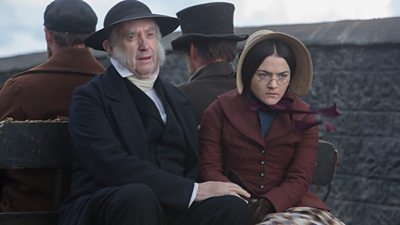Interview with Finn Atkins
Finn Atkins plays Charlotte Brontë in Sally Wainwright's one-off drama for BBC One.

It’s not a sugar-coated drama about the Brontë family. A lot more went on in their household than people necessarily know about.
Tell us about your character?
I play Charlotte Brontë, who is now the oldest of the three sisters - there were two older sisters who died. She is small but mighty, fiercely intelligent and ambitious, especially considering the age that she lived in and the fact she was a woman. She encapsulates the repressed woman who can’t do what she wants to do. She conforms in some ways and wants the idealistic life - but she’s way too ambitious for that.
How did you get involved?
There was a lengthy audition process, over a long period of time. There was a lot of work involved, but it was exciting to do a project of this nature and also to work with Sally, whom I'm a massive fan of.
What makes it unique?
It’s not a sugar-coated drama about the Brontë family. It might surprise, because is shows them as real people. A lot more went on in their household than is necessarily known about. It’s nice to remind people these aren’t fairy tales, the Brontës were real people who went through a lot. It shows that side of their story.
What did you think of the script when you first read it?
I thought it was incredible. Sally is an amazing writer; it’s a script for a period drama - but one that feels real. A lot of period dramas are visually incredible, but lack the element of realism that this has definitely got. Sally has written the dialogue in a way that is true to each character and reflects each of their stories very well.
What is it about To Walk Invisible that will excite and appeal to audiences?
People will be able to relate to these characters. Even though they’re incredibly intelligent and they’ve written these revered novels, they experience things that still happen today. It will excite people to see their journey portrayed at a time where women didn’t really write, when it wasn’t the done thing. We are in an age now where feminism is still important and it’s fascinating to see that way back then these women were breaking all the rules and crossing the boundaries for female writers. To Walk Invisible will make you feel like you know the Brontë sisters on a much more personal level.
Has it changed your perception of the work of the Brontës?
I studied their work at school but I had never sat down as an adult and enjoyed - or tried - reading their books. But having to read it for this has opened up a whole new world. Even if you know their work, there’s not just Charlotte’s and Emily’s, there’s also Anne’s and all their poetry, which not many people have read, even their juvenilia!
It's something I would probably never have discovered had I not been doing this, and it has obviously changed my opinion of them. Actually it’s helped me to form an opinion rather than changing it, which is amazing.
Sally Wainwright on writing To Walk Invisible…
"I wanted it to feel as authentic as it could. When people watch it I want them to feel that they are transported back in time. It’s not a chocolate box world and I hope it does reflect the real world that they lived in.
The primary aim of To Walk Invisible is to entertain people, for people to engage with it as drama and to enjoy it. I hope people will want to go away and know more about the Brontës, read their novels and read Emily’s poetry.
What’s interesting about the story to a contemporary audience is the domestic situation of the three Brontë sisters. The family are living with the alcoholic Branwell, who was very ill. It started in 1845 and goes through to 1848 when he died. The story is really about these three women living with an alcoholic brother and how they start trying to publish."

